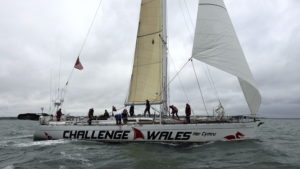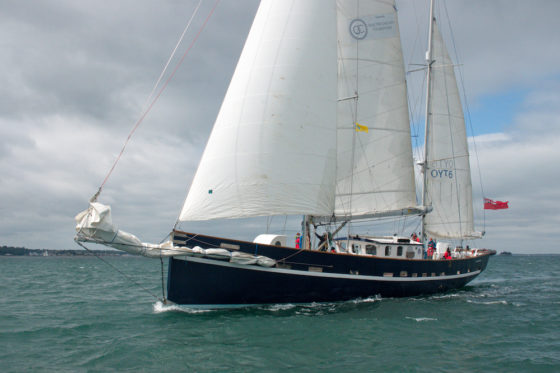
De jeunes marins affrontent des vents forts pour terminer la course Mayflower 401

Après deux jours de fort vent de face d'ouest, 12 voiliers-écoles britanniques, dont l'équipage est composé de jeunes, sont arrivés sains et saufs à Dartmouth jeudi matin de la semaine dernière pour marquer la fin de la Mayflower 401 Small Ships Race de l'ASTO.
L'événement, qui a commencé le 15 août, a vu une flotte d' organisations caritatives britanniques pour les jeunes Sail Training participer à une course pour commémorer le 401e anniversaire du Mayflower . Initialement prévu sous le nom de Mayflower 400 SSR l'année dernière, l'événement a été reporté en raison de la pandémie de Covid-19.
La course a commencé à la marina Ocean Village de MDL Marina à Southampton et a vu les navires contourner l'extrémité est de l'île de Wight avant de se diriger à nouveau vers l'ouest en direction de Dartmouth. Des vents forts et une mer agitée ont battu la flotte, mais le moral des équipages est resté élevé.
Le premier navire à franchir la ligne d'arrivée juste au sud de Mew Stone était le yacht de 72 pieds de Challenge Wales , Challenge Wales . Elle a été suivie de peu par Sigma 38 de Morning Star Trust, Eastern Star .
Tout comme le Mayflower en 1620, quelques navires de la flotte ont été contraints de s'arrêter pour se reposer et réparer, avec l' ancrage Prolific d'Ocean Youth Trust South dans la baie de Studland aux premières heures de mercredi matin.
Pendant ce temps, d'autres navires, dont la jonque de Boleh Trust, Boleh, et la goélette à hunier de The Island Trust, Johanna Lucretia , ont décidé de se retirer tôt en raison des forts vents d'ouest rendant la navigation très difficile.
Après la course a eu lieu une cérémonie de remise des prix sur l'eau , avec une vidéo des temps forts sur Facebook.
Ci-dessous les lauréats :
- Trophée des Sept Mers (honneurs de la ligne) – Challenge Wales , Challenge Wales
- Trophée Aurora (Premier après temps corrigé) – Jolie Brise , Dauntsey's School
- Trophée Richard Langhorn (Esprit de la course) – Olga , Sailing Tectona CiC
- Bloodhound Cup (équipe d'âge moyen la plus jeune) – Jolie Brise , Dauntsey's School
Beaucoup de jeunes n'avaient jamais navigué auparavant, encore moins pendant la nuit dans des conditions difficiles.
Mark Todd, président de l'Association of Sail Training Organizations (ASTO), a déclaré aux jeunes équipages : , souvenez-vous de cette expérience et sachez que vous pouvez la traverser. Votre première nuit en mer a été une navigation au vent dans de grosses mers et de grands vents, et vous devriez vous sentir immensément fier de vous. Le travail d'équipe, la détermination, la résilience et les compétences en communication sont la raison d'être de Sail Training et ce sont des compétences qui vous aideront à traverser la vie.

OYT Prolifique . Image reproduite avec l'aimable autorisation de Max Murdie.
Les navires de formation à la voile utilisent l'expérience d'être en mer pour enseigner aux jeunes la résilience et les défis à relever, tout en s'amusant et en se faisant de nouveaux amis, et cet événement a été la première occasion pour ces navires et ces jeunes de se réunir depuis le verrouillage. Depuis la mi-juillet, plus de 30 associations caritatives Sail Training sont enfin à nouveau en mesure d'offrir des expériences positives qui changent la vie des jeunes et des personnes handicapées.
